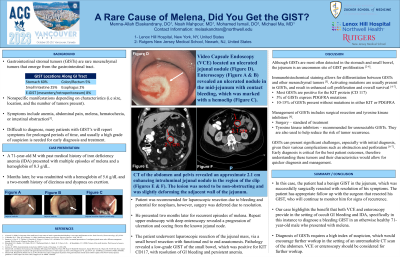Tuesday Poster Session
Category: Small Intestine
P4153 - A Rare Cause of Melena: Did You Get the GIST?
Tuesday, October 24, 2023
10:30 AM - 4:00 PM PT
Location: Exhibit Hall

Has Audio

Menna-Allah A. Elaskandrany, DO
Lenox Hill Hospital
Astoria, NY
Presenting Author(s)
Menna-Allah Elaskandrany, DO1, Noah Mahpour, MD2, Mohamed Ismail, DO3, Michael Ma, MD2
1Lenox Hill Hospital, Astoria, NY; 2Lenox Hill Hospital, Northwell Health, New York, NY; 3Rutgers New Jersey Medical School, Newark, NJ
Introduction: Gastrointestinal stromal tumors (GISTs) are rare mesenchymal tumors that emerge from the gastrointestinal tract. Associated symptoms include anemia, abdominal pain, melena, or intestinal obstruction. Patients with GISTs report symptoms for prolonged periods of time, and a high grade of suspicion is needed for early diagnosis. The presentation of occult GI bleeding due to GISTs is rarely presented in the literature. We present a patient with occult GI bleeding, and resultant workup diagnosing a GIST.
Case Description/Methods: A 71-year-old male with past medical history of iron deficiency anemia (IDA) presented in May 2021 with multiple episodes of melena and a hemoglobin of 8.3 g/dL. Esophagogastroduodenoscopy (EGD) showed mild gastritis and duodenitis, with no active bleeding. In July 2021, he was readmitted for persistent unexplained IDA and a hemoglobin of 5.6 g/dL. Repeat EGD and colonoscopy revealed duodenitis and a cecal polyp (tubular adenoma on pathology). Video Capsule Endoscopy (VCE) in January 2023 located an ulcerated jejunal nodule. Subsequent enteroscopy revealed an ulcerated nodule in the mid-jejunum with contact bleeding, which was marked with a hemoclip. CT abdomen and pelvis revealed a 2.1 cm intraluminal jejunal nodule in the region of the clip. The lesion was non-obstructing but slightly deforming the adjacent wall of the jejunum. Laparoscopic small bowel resection was recommended due to bleeding and potential for neoplasm but was deferred due to resolved symptoms. He presented two months later for recurrent melena. Repeat upper endoscopy with deep enteroscopy revealed progression of ulceration and oozing from the jejunal node. He underwent laparoscopic resection of the mass, via a small bowel resection with functional end to end anastomosis. Pathology revealed a KIT CD 117 positive low-grade GIST of the small bowel, with resolution of GI bleeding and anemia.
Discussion: Most GISTs are positive for the KIT protein (CD 117). Immunohistochemical staining allows for differentiation between GISTs and other mesenchymal tumors that do not express KIT. While surgical resection is the standard of treatment for benign GISTs, targeted therapy with tyrosine kinase inhibitors is recommended for malignant or unresectable GISTs. In this case, the patient had a benign jejunal GIST that was resected with resolution of symptoms. Although GISTs are rare, they can present significant challenges, therefore early diagnosis is critical for the best patient outcomes.

Disclosures:
Menna-Allah Elaskandrany, DO1, Noah Mahpour, MD2, Mohamed Ismail, DO3, Michael Ma, MD2. P4153 - A Rare Cause of Melena: Did You Get the GIST?, ACG 2023 Annual Scientific Meeting Abstracts. Vancouver, BC, Canada: American College of Gastroenterology.
1Lenox Hill Hospital, Astoria, NY; 2Lenox Hill Hospital, Northwell Health, New York, NY; 3Rutgers New Jersey Medical School, Newark, NJ
Introduction: Gastrointestinal stromal tumors (GISTs) are rare mesenchymal tumors that emerge from the gastrointestinal tract. Associated symptoms include anemia, abdominal pain, melena, or intestinal obstruction. Patients with GISTs report symptoms for prolonged periods of time, and a high grade of suspicion is needed for early diagnosis. The presentation of occult GI bleeding due to GISTs is rarely presented in the literature. We present a patient with occult GI bleeding, and resultant workup diagnosing a GIST.
Case Description/Methods: A 71-year-old male with past medical history of iron deficiency anemia (IDA) presented in May 2021 with multiple episodes of melena and a hemoglobin of 8.3 g/dL. Esophagogastroduodenoscopy (EGD) showed mild gastritis and duodenitis, with no active bleeding. In July 2021, he was readmitted for persistent unexplained IDA and a hemoglobin of 5.6 g/dL. Repeat EGD and colonoscopy revealed duodenitis and a cecal polyp (tubular adenoma on pathology). Video Capsule Endoscopy (VCE) in January 2023 located an ulcerated jejunal nodule. Subsequent enteroscopy revealed an ulcerated nodule in the mid-jejunum with contact bleeding, which was marked with a hemoclip. CT abdomen and pelvis revealed a 2.1 cm intraluminal jejunal nodule in the region of the clip. The lesion was non-obstructing but slightly deforming the adjacent wall of the jejunum. Laparoscopic small bowel resection was recommended due to bleeding and potential for neoplasm but was deferred due to resolved symptoms. He presented two months later for recurrent melena. Repeat upper endoscopy with deep enteroscopy revealed progression of ulceration and oozing from the jejunal node. He underwent laparoscopic resection of the mass, via a small bowel resection with functional end to end anastomosis. Pathology revealed a KIT CD 117 positive low-grade GIST of the small bowel, with resolution of GI bleeding and anemia.
Discussion: Most GISTs are positive for the KIT protein (CD 117). Immunohistochemical staining allows for differentiation between GISTs and other mesenchymal tumors that do not express KIT. While surgical resection is the standard of treatment for benign GISTs, targeted therapy with tyrosine kinase inhibitors is recommended for malignant or unresectable GISTs. In this case, the patient had a benign jejunal GIST that was resected with resolution of symptoms. Although GISTs are rare, they can present significant challenges, therefore early diagnosis is critical for the best patient outcomes.

Figure: A. Endoscopic view of ulcerated nodule in the mid-jejunum with contact bleeding. B. Coronal view of the jejunal nodule on CT scan of the abdomen. C. Transverse view of the jejunal nodule on CT scan of the abdomen.
Disclosures:
Menna-Allah Elaskandrany indicated no relevant financial relationships.
Noah Mahpour indicated no relevant financial relationships.
Mohamed Ismail indicated no relevant financial relationships.
Michael Ma indicated no relevant financial relationships.
Menna-Allah Elaskandrany, DO1, Noah Mahpour, MD2, Mohamed Ismail, DO3, Michael Ma, MD2. P4153 - A Rare Cause of Melena: Did You Get the GIST?, ACG 2023 Annual Scientific Meeting Abstracts. Vancouver, BC, Canada: American College of Gastroenterology.
